Publications
Articles, publications, books, tools and multimedia features from the U.S. Institute of Peace provide the latest news, analysis, research findings, practitioner guides and reports, all related to the conflict zones and issues that are at the center of the Institute’s work to prevent and reduce violent conflict.
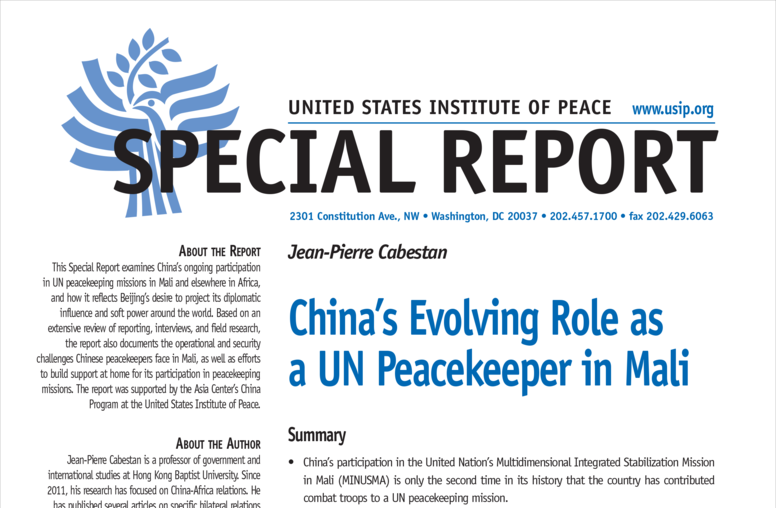
China’s Evolving Role as a U.N. Peacekeeper in Mali
Chinese troops have been stationed in Mali for the last half-decade as part of the UN-mandated stabilization force. Deployed after rebel groups overran large portions northeastern Mali in 2013, it was just the second time Beijing had ever contributed combat troops to a UN peacekeeping mission. This Special Report examines how China is using its peacekeeping activities in Mali as an opportunity to train troops and test equipment in a hostile environment—and as a way of extending its diplomatic reach and soft power in Africa and beyond.

Amb. Joseph Yun on the Latest with North Korea
With the diplomatic process between the U.S. and North Korea at a stalemate, Ambassador Joseph Yun discusses the key takeaways from this week’s inter-Korean summit and the improvement in North-South relations. For Washington and Pyongyang to move forward, Yun says the two sides need to first agree on a definition of, and process for, the denuclearization of the Korean Peninsula.
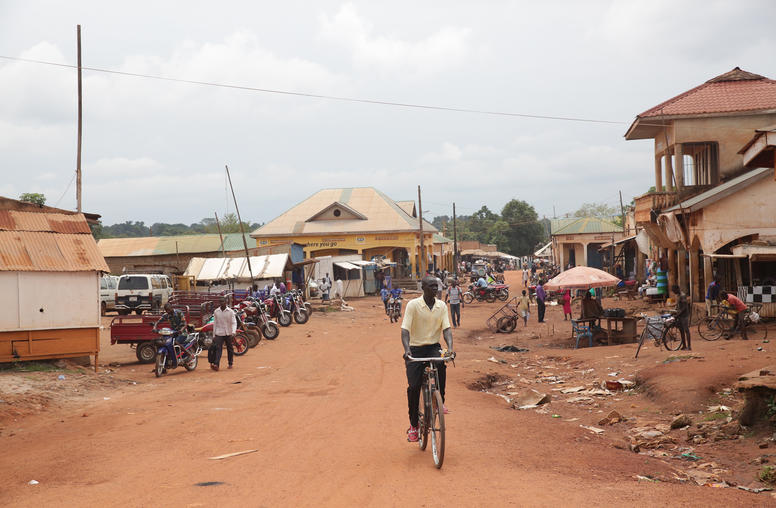
In South Sudan, the Trust Deficit Could Doom a new Peace Deal
On September 12, after nearly nine months of talks, the warring parties in South Sudan signed a “revitalized” peace agreement, superseding a 2015 accord and bringing an end to the High Level Revitalization Forum. But fighting has continued in the days since the deal was signed, and many remain skeptical that this agreement will succeed. USIP’s Aly Verjee discusses the deal.
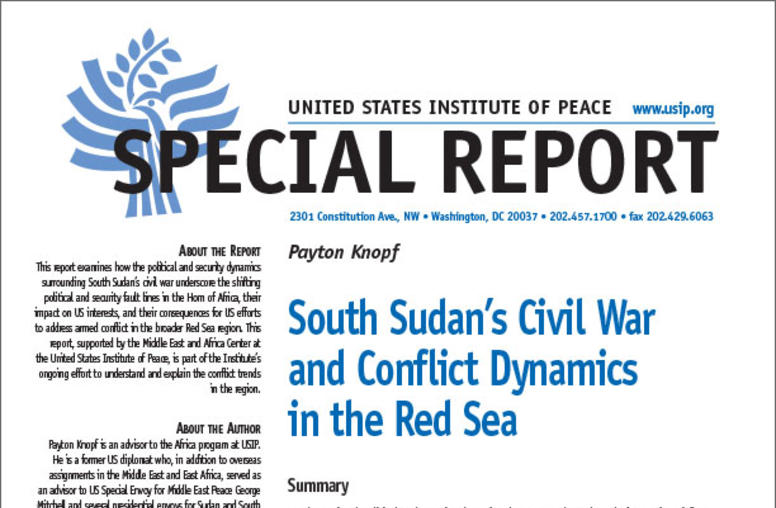
South Sudan’s Civil War and Conflict Dynamics in the Red Sea
The five-year-old civil war in South Sudan is an unparalleled humanitarian and security crisis, causing the largest exodus of refugees on the African continent since the Rwandan genocide and leaving over a third of the population displaced and two-thirds severely food insecure. Beyond the human toll on South Sudan’s long-suffering citizens, the country’s unraveling underscores the shifting political and security fault lines in the Horn of Africa. This Special Report surveys the region’s various interstate hostilities and intrastate conflicts and suggests ways the United States can reassert its influence to begin contributing meaningfully to the resolution of South Sudan’s civil war and conflicts in the greater Red Sea region.
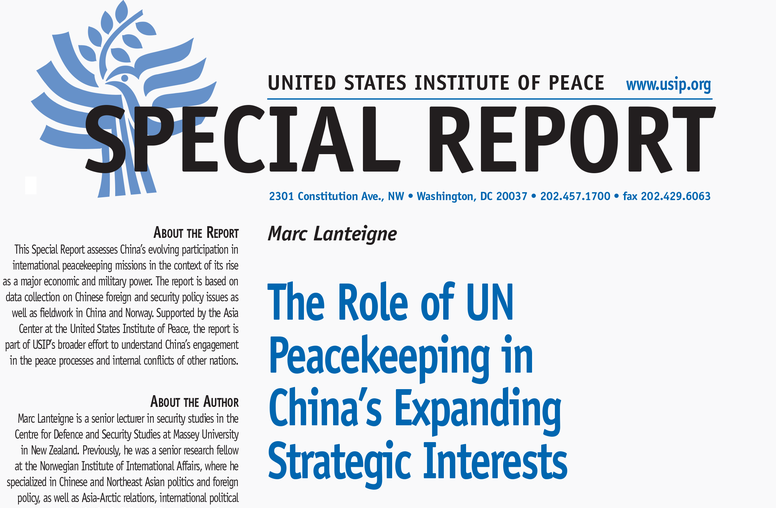
The Role of U.N. Peacekeeping in China’s Expanding Strategic Interests
Despite its growing status as a major economic and military power, China continues to be a strong supporter of UN peacekeeping operations. China is not only the second-largest financial contributor to UN peacekeeping (after the United States), it has roughly 2,500 personnel deployed in ongoing missions, including in active combat zones in Mali and South Sudan—far more than any other permanent member of the UN Security Council. This Special Report examines what China hopes to gain from its participation in UN peacekeeping, as well as the challenges it will face as its troops find themselves in more dangerous “peace enforcement” situations.
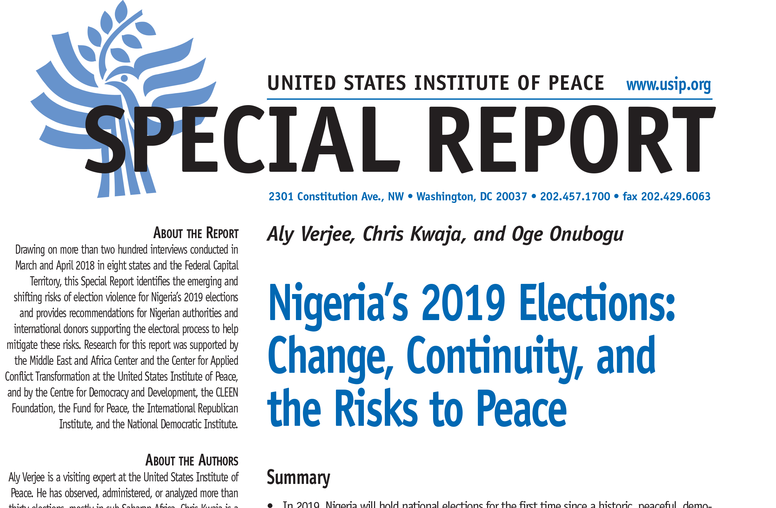
Nigeria’s 2019 Elections: Change, Continuity, and the Risks to Peace
Drawing on more than two hundred interviews conducted in March and April 2018 in eight states and the Federal Capital Territory, this Special Report identifies the emerging and shifting risks of election violence for Nigeria’s 2019 elections and provides recommendations for Nigerian authorities and international donors supporting the electoral process to help mitigate these risks.

The Risks of Violence in Nigeria’s 2019 Elections
In February 2019, Nigerians go to the polls to elect the country’s next president, parliament and state governors. Nigeria’s elections have historically been tense, and as the campaign gets underway there are concerns the upcoming process will see new violence. USIP’s Chris Kwaja, Oge Onubogu and Aly Verjee discuss the significance of the vote, what has changed since the 2015 elections, and suggest what can be done to mitigate risks of violence.

China’s Role in Myanmar’s Internal Conflicts
This report is the first in the Senior Study Groups (SSGs) series that USIP is convening to examine China's influence on conflict dynamics around the world. A group of thirteen experts met from February to June 2018 to assess China’s involvement in Myanmar’s internal conflicts, particularly those in Rakhine, Kachin, and Shan states, as well as China’s impact on Myanmar’s overall peace process.
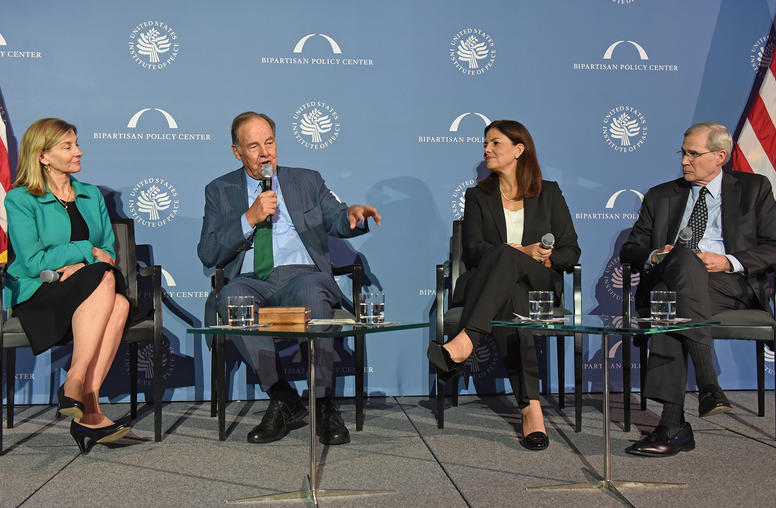
Terrorism has “Changed Dramatically” Since 9/11, Experts say Bipartisan Solutions Needed
Despite counterterrorism efforts that have “thwarted dozens of plots and thoroughly disrupted terrorist capabilities,” we “cannot rest” in our efforts to prevent violent extremism, said Director of National Intelligence Daniel Coats Tuesday night at an event at the U.S. Institute of Peace. The event, co-hosted by USIP and the Bipartisan Policy Center on the 17th anniversary of 9/11, recognized 9/11 Commission chairs Gov. Thomas Kean and Rep. Lee Hamilton for their work leading the Commission and for continuing this work through the Task Force on Extremism in Fragile States.

Nancy Lindborg on Addressing Extremism in Fragile States
Seventeen years after the 9/11 attacks, Nancy Lindborg details the findings of an interim report from the congressionally mandated Task Force on Extremism in Fragile States. Convened by USIP, the Task Force will devise a comprehensive new strategy for addressing the underlying causes of extremism in fragile states, says Lindborg, a member of the Task Force.